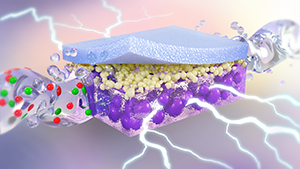
Electrochemical separations offer competitive advantages for the recovery of bio-based fuel and chemical precursors via selective extraction. Electrodeionization (EDI) is a hybrid technology that combines electrodialysis and ion-exchange technologies into a single unit operation using ion-exchange phenomena and an applied electric field to drive ionic separation. EDI is especially advantageous for the removal of weakly ionizable species due to in-situ water splitting that continuously occurs within the EDI stack under the application of an applied potential. This study reports of a new class of symmetric and asymmetric Janus bipolar resin wafers that enhance the ionic conductivity in EDI while having the additional functionality of splitting water into protons and hydroxide ions. The latter attribute is important for applications that require pH modulation, including organic acid separation and recovery. Artwork conveying this new class of Janus bipolar resin wafers for electrodeionization is featured on the journal’s back cover. This work was a collaborative effort between Argonne National Laboratory (Lauren Valentino and Yupo Lin) and Louisiana State University (Matthew Jordan, Nargiza Nazyrynbekova, Varada Menon Palakkal, Subarna Kole, Deepra Bhattacharya, and Christopher Arges).
